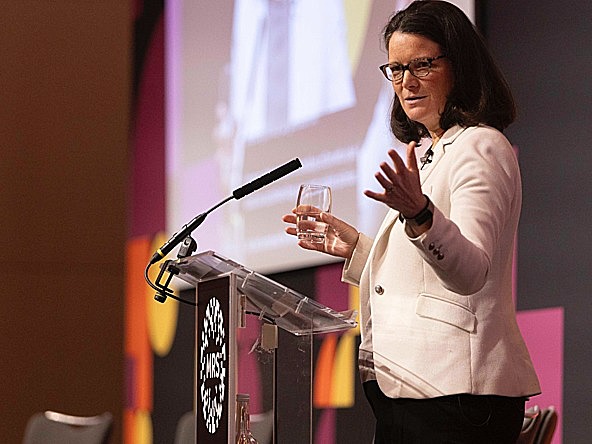NEWS12 March 2024
All MRS websites use cookies to help us improve our services. Any data collected is anonymised. If you continue using this site without accepting cookies you may experience some performance issues. Read about our cookies here.
NEWS12 March 2024
UK – The 2024 general election will be “fought against a backdrop of very low public trust”, according to The Guardian’s political editor, Pippa Crerar.

Speaking in the opening keynote at the annual Market Research Society Annual Conference 2024 today ( 12 March), Crerar discussed her career in political journalism, in particular her work in exposing corruption and lies within the Conservative government and Number 10 during lockdown.
She kicked off proceedings reflecting on today’s political environment versus that of 1997, when New Labour were set for a general election victory.
“It’s a very different landscape to 1997,” she said. “Not just because of all the political changes since then – the financial crash, Brexit, the pandemic, to name a few – but also because back then the economy was booming and it felt like Britain was a major international player. There was a sort of cultural buzz in the air."
Not only was the UK a place with cultural clout, there was also an element of "trust in politics and politicians," Crerar said. "Labour was trusted by more than 80% of the public, [although this changed] dramatically by the time they left office 13 years later dented by events like the Iraq war and the expenses scandal.”
Before arriving at The Guardian in August 2022, Crerar was political editor at the Daily Mirror. It was while there that she was instrumental in unearthing the story of government adviser Dominic Cummings breaking lockdown rules and travelling to Barnard Castle.
“The story had an impact beyond the political drama,” she said. “It dented faith in government at a really crucial time. UCL did some analysis during that first summer of the pandemic which found that public confidence in the government’s ability to handle the Covid pandemic dropped sharply following the news that Cummings had broken lockdown rules.
“I’ll be honest. I found it really hard to process the idea that our investigation may have led to people being less likely to follow the rules. But I also strongly believe that people were asking so much of us should be able to make similar sacrifices themselves.”
But it was not all doom and gloom and the notion of a recovering faith in politics is not a totally alien concept.
“Trust in governments is actually quite volatile in Britain and can change rapidly in response to events,” Crerar explained. “But there’s one constant around election times, and that is that a new government has a big effect on boosting trust while a victory by an incumbent party does not.
“Perhaps a new government is a prerequisite to beginning to restore faith in public life.”
She cited a recent Ipsos poll about trust of different professions, in which “only 9% of voters said that they trusted politicians to tell the truth (compared to a lofty 12% in 2022 )”.
“That’s the lowest it’s been since we started asking the question in 1983,” she said, adding that journalism was trusted by 21% of the population and, the nearest category to research and analytics, pollsters, 45%.”
Crerar also talked about marketing slogans ahead of general elections, from the Conservative’s “Labour isn’t working” in 1979, to Boris Johnson’s “Get [Brexit] done” in 2019.
“We don’t know yet what Starmer or Sunak’s slogans are going to be this time around. Somebody suggested “No drama Starmer”. Not sure what Sunak’s going to think up. “Not Truss”, I suppose. “Time for change” is a powerful sentiment so we should probably prepare ourselves for that at the next general election.”
0 Comments